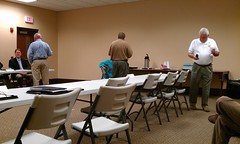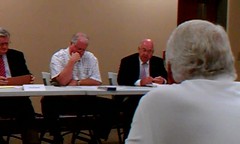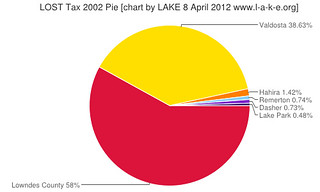 Here are videos of the
Local Option Sales Tax (LOST) talks yesterday morning
between Lowndes County and the local cities (Valdosta, Hahira, Remerton, Dasher, and Lake Park.
Not really negotiations, these were more an exchange of views.
The county’s position is the same as Chairman Ashley Paulk told me after
the county’s
four minute work session earlier that morning:
the county could claim 72% of LOST based on cost of services delivered
to the whole county,
but the county’s offer is to stick with the 58% share from 2002.
The cities all would like a bigger share.
Here are videos of the
Local Option Sales Tax (LOST) talks yesterday morning
between Lowndes County and the local cities (Valdosta, Hahira, Remerton, Dasher, and Lake Park.
Not really negotiations, these were more an exchange of views.
The county’s position is the same as Chairman Ashley Paulk told me after
the county’s
four minute work session earlier that morning:
the county could claim 72% of LOST based on cost of services delivered
to the whole county,
but the county’s offer is to stick with the 58% share from 2002.
The cities all would like a bigger share.
The venue was the county’s meeting room next to Commission Chambers. There was no sound feed available in there, so sound is variable.
First
County Manager Joe Pritchard explained
 the state-mandated procedures
and
Lowndes County’s position,
both of which were spelled out in a
three page paper.
Basically, the county wants to stick to the percentages negotiated in 2002,
although by the county’s reckoning it could ask for a much higher percentage.
the state-mandated procedures
and
Lowndes County’s position,
both of which were spelled out in a
three page paper.
Basically, the county wants to stick to the percentages negotiated in 2002,
although by the county’s reckoning it could ask for a much higher percentage.
 None of the cities had a written position paper.
Valdosta Mayor John Gayle noted Valdosta had grown more than the
county as a whole.
County Chairman Ashley Paulk responded that the city couldn’t grow
without the county growing.
The Mayor said nontheless most growth was in Valdosta.
The Chairman asked whether that was growth in households?
The Mayor said he didn’t know the answer to that right now.
The Chairman remarked that according to his reading of the census,
it was mostly not in households.
None of the cities had a written position paper.
Valdosta Mayor John Gayle noted Valdosta had grown more than the
county as a whole.
County Chairman Ashley Paulk responded that the city couldn’t grow
without the county growing.
The Mayor said nontheless most growth was in Valdosta.
The Chairman asked whether that was growth in households?
The Mayor said he didn’t know the answer to that right now.
The Chairman remarked that according to his reading of the census,
it was mostly not in households.









